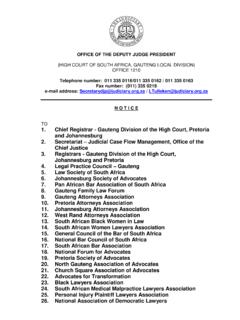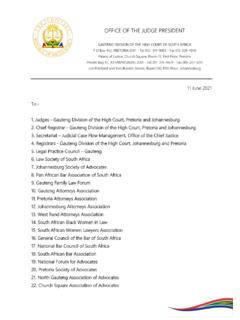Transcription of REPUBLIC OF SOUTH AFRICA Reportable IN THE LABOUR …
1 REPUBLIC OF SOUTH AFRICA . Reportable IN THE LABOUR APPEAL COURT OF SOUTH AFRICA , JOHANNESBURG. Case no: JA 78/11. In the matter between: RAND WATER Appellant and JOHAN STOOP First Respondent JOHANNES BUCKLE Second Respondent Date of hearing: 22 August 2012. Date of Judgment: 08 November 2012. Summary: -Contract of employment- Employees dismissed for fraud and employer incurred losses- Employer claims damages in terms of s77 (3) of the of the Basic Conditions of Employment Act, 75 of 1997- 2. -Employees raised point in limine that LABOUR Court lacks jurisdiction- LABOUR Court has jurisdiction when the issue in dispute is related to, linked to, or connected with an employment contract- Employer entitled to claim damages from employees Employees point in limine dismissed with costs. CORAM: WAGLAY AJP, ZONDI AJA and MUSI AJA. JUDGMENT. WAGLAY AJP.
2 Introduction [1] This is an appeal against the finding by the LABOUR Court that it had no jurisdiction to determine the appellant s damages claims against the first and second respondents because the claims did not concern a contract of employment, or a contract of employment as envisaged by s77 (3) of the Basic Conditions of Employment Act, 75 of 1997 (hereafter the BCEA ), and that the LABOUR Court, in any event, had no jurisdiction to entertain a claim for damages against the respondents. Background facts [2] The Respondents are former employees of the appellant. They were charged with and found guilty of misconduct by an independent chairperson at an internal disciplinary hearing. 3. [3] The findings of the disciplinary hearing included a finding that the respondents . misconduct caused million losses to Rand Water [the employer].. [4] The respondents believing their dismissals to be both substantively and procedurally unfair referred it as a dispute to the Commission for Conciliation, Mediation and Arbitration (CCMA) for conciliation.
3 Conciliation failed to resolve the dispute. The Appellant then successfully applied to the Director of the CCMA. to transfer the respondents claims for adjudication to the LABOUR Court under the provisions of s191(7) of the LABOUR Relations Act of 1995 (hereafter the LRA). [5] The first respondent served the referral for his unfair dismissal claim in terms of the LRA upon the appellant and in turn, the appellant instituted a counter-claim against him for damages in terms of the BCEA. Before the second respondent could refer his unfair dismissal dispute to the LABOUR Court, the appellant instituted a claim for damages against the second respondent in terms of the BCEA and the second respondent then instituted a counter-claim for unfair dismissal in terms of the LRA. [6] Although the respondents applied independently to challenge their dismissals in the LABOUR Court, the disputes have now been consolidated.
4 In both cases, the respondents claim that their dismissals were unfair and seek reinstatement. The appellant, in turn has instituted a claim for damages against them for breach of contract. The pleadings against the first respondent [7] The particulars of the counter-claim against the first respondent (applicant in the pleadings) read as follows: 25. The Applicant, acting personally, and the Respondent, duly represented by its Acting General Manager, concluded a written contract of employment on or about 23 August 1999. A copy of the written employment contract is annexed marked "A". 4. 26. It was an implied, alternatively, a tacit term of the contract of employment that: the Applicant had the duty to perform his services diligently and in the exercise of the care and skill which can be reasonably expected of a person with their knowledge and experience.
5 The Applicant had a duty to act in good faith, including the duty to work honestly, to desist from any form of nepotism or favouritism, to act within their authority and to comply with the Respondent's procurement rules and policies, as well as section 57 of the Public Finance Management Act, 1999;. in his relationship with suppliers, including SWR Projects CC, the Applicant undertook in addition to the aforesaid duties not to engage in (to) any form of collusion or unfair business practices and/or promote honesty and integrity and to look after and act in the best interests of the Respondent. 27. The Applicant, as a senior employee employed by the Respondent, owed the Respondent a fiduciary duty of loyalty, trustworthiness and good faith. 28. As a senior employee, the Applicant was charged with the financial responsibility of approving payments to contractors to the Plaintiff, including SWR.
6 Projects CC. 29. For the period 2002 to 2007, SWR Projects CC was the approved supplier and was awarded several tenders by the Respondent from which it derived the right to perform various projects for the Respondent. 30. Pursuant thereto, SWR Projects CC duly represented, entered into various joint venture agreements with the Respondent, duly represented. The joint venture agreements were all concluded in Johannesburg. 31. It was an implied, alternatively, a tacit term of each of the joint venture agreements that: 5. the parties to the joint venture would act in good faith in relation to each other and/or act in such a manner so as to advance the joint venture for their mutual benefit;. SWR Projects CC would claim only such monies from the Respondent as were due and owing;. SWR Projects CC would support any claim for payment from the Respondent with vouchers or proof of expenditure in the case of the joint (Jo) venture.
7 SWR Projects CC would: charge the correct rate for services rendered; and/or charge only for work done; and/or charge the agreed or usual, or a reasonable price for goods and services rendered. 32. In each case mentioned above, the Applicant was, as part of his duties, to approve invoices submitted by SWR Projects CC for work that it had done and for which it was entitled to payment. 33. The Applicant was obliged, in terms of his contract of employment, to ensure that SWR Projects CC submitted invoices in compliance with its obligations set out in paragraph 31 above and/or to approve only those invoices for which SWR Projects CC was entitled to be paid for actual work done in accordance with the agreed, alternatively the usual, further alternatively the reasonable rates. 34. During the period 13 May 2002 to August 2007, the Applicant and SWR.
8 Projects CC conspired to defraud the Respondent by inducting the Respondent's Accounting Department to effect payments to SWR Projects CC for sums that the Applicant and SWR Projects CC knew were not owing and/or due and payable to SWR Projects CC. In amplification thereof: SWR Projects CC submitted invoices to the Respondent, represented by the Applicant for work not done and/or which reflected overcharges and/or the incorrect rate and/or charges for work duplicated and/or charges contrary to the tender documents and/or without proper supporting documents ("the defects"). 6. The Applicant approved payments in respect of the invoices contemplated in paragraph knowing of the defects. Induced by these actions, the Respondent paid SWR Projects CC. the sum of R8 091 for which the Respondent was not liable. 35. Alternatively, even if fraud cannot be proved by approving the payments to (20) SWR Projects CC, the Applicant breached his contract of employment with the Respondent in one, more, or all of the following ways: By failing to perform their services diligently, and in the exercise of due care.
9 By failing to act in the best interests of the Respondent. By failing to comply with the Respondent's procurement policies. By failing to act in good faith. By acting in collusion with SWR Projects CC. 36. The Applicant accordingly materially breached all the terms of the contract of employment pleaded above. 37. Had the Applicant performed his contractual obligations, the Respondent would not have suffered any loss. 38. Consequently, as a result of the Applicant's breach of the employment contract, the Respondent suffered damages in the sum of R8 091 to put it in a position it would have been in had the Applicant complied with his employment duties. 39. The Applicant has admitted causing the Respondent loss in the sum of R748 40. In the premises, the Applicant is liable to the Respondent in the sum of R748 7. 41. As a result of the Applicant's conduct, the Respondent paid SWR Projects CC the sum of R8 091 such sums were not owing.
10 42. In the premises, as a result of the Applicant s breach, as aforesaid, the Respondent has suffered damages, in the amount of R7 [my underlining]. The pleadings against the second respondent [8] In the case of the second respondent although the counter-claim1 is not framed by the appellant in identical fashion, it is similar to the counter-claim filed against the first respondent. Again, the appellant asserts that the second respondent breached his contract of employment in the same manner as the first respondent. The allegation is made that as a result of the breach of the employment contract, the appellant suffered damages. [9] There is, in the second respondent s pleading, one major difference: an alternative claim, in delict, is pleaded as follows: Its jurisdiction to order the Respondent to pay the Applicant's damages arises from two independent sources: Firstly, section 77 (3) of the Basic Conditions of Employment Act, 1997, And Secondly, the Court's inherent powers empowers, under section 158(1)(a)(iv) of the Act, which allows the LABOUR Court to make any appropriate order, including an award of compensation in any of the circumstances contemplated by the LABOUR Relations Act, 1995 (Act).















